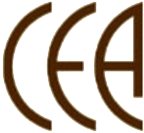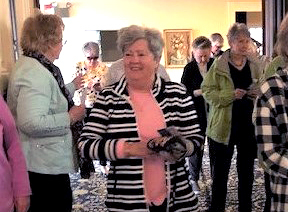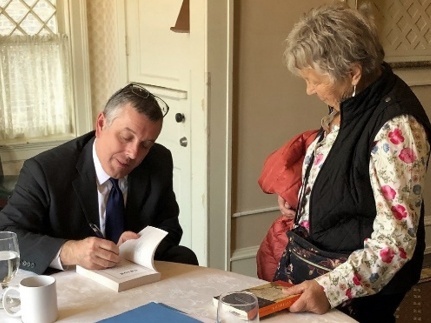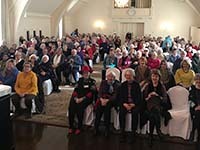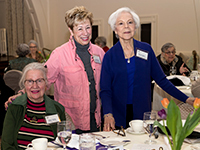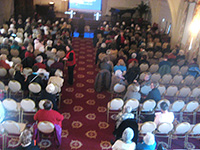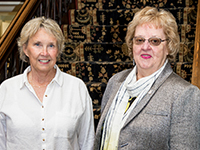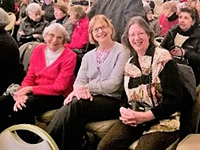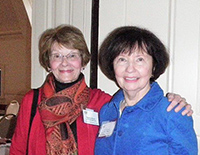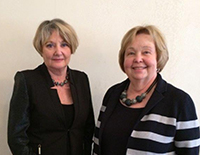For Speakers
CEA often contracts with speakers a year in advance to ensure that the membership hear from experts who are often in great demand in their respective fields. Members provide recommendations and the program chair contacts the speakers. The lectures are one and a quarter hours; films are one and one half hours. No questions are taken after in-person presentations. Speakers may bring copies of publications to sell to the membership but must inform the program chair in advance so that appropriate space can be provided. The membership prefers to have the president announce that these materials are available so that the speaker can concentrate on the presentation. The speaker must transport any books or CD's.
Elisabeth Israels Perry published the following article in the Newsletter of the Organization of American Historians, (36/3, August 2008) describing her experience speaking for the CEA.
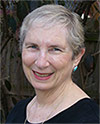
Connecting to a Women's Historical Tradition
Elisabeth I. Perry
From Lecturer's Notebook, OAH Distinguished Lectureship Program
The e-mail marked "urgent" from the OAH could not be ignored. Was I free to lecture on Eleanor Roosevelt to the College Endowment Association (CEA) in Milwaukee at the end of the month? As the month was February, the thought of flying further into the cold did not exactly appeal. But of course I said yes. I pulled up my tried and true Eleanor Roosevelt lecture, tweaked the prose, freshened my Power Point, and, a couple of weeks later, flew north.
The CEA, a group I had never heard of before, was well organized. Almost as soon as I said yes, its officers phoned to make arrangements. Since the lecture was booked for 10 a.m., they put me up the night before at the venerable University Club. (The view of Lake Michigan from the club's top floor lounge was spectacular.) My hosts picked me up promptly after breakfast and drove the few blocks to another venerable Milwaukee institution, the Woman's Club of Wisconsin.
I could not have imagined a more perfect place for my talk, in which I describe the "training for public life" that Eleanor Roosevelt received in New York women's voluntary associations in the 1920s. I have given versions of the talk since 1984, the year of her centennial, when I published an essay on the topic in a commemorative anthology.1 Most of my audiences have been academic, however. This time I was addressing listeners who truly understood what a woman's voluntary association was all about.
The College Endowment Association is rooted in the educational culture of white middle-class women in the Midwest of the late 1800s. The organization evolved from a group of Milwaukee women who, after attending "extension lectures" in 1874 at the Milwaukee Female College (founded 1852), formed a "culture" club, which they called the "Ladies' Arts and Science Class." In 1890, the club decided to raise an endowment for the financially pressed college and changed its name to reflect its new purpose. Fund-raising alone failed to inspire sufficient membership and when the group shifted its focus back to learning, it attracted some 500 members...
Today, it organizes weekly lectures from October through February (excluding holidays), charging only a $50 (now $95) subscription fee. It also underwrites scholarships and visiting scholars for Appleton's Lawrence University, which had absorbed the woman's college in 1964.2
The CEA has a few traditions that, as an academic, I found a bit unusual (although by no means unpleasant). For example, after I checked on my Power Point, I was escorted to a small parlor, where I chatted with several of the group's officers and had my picture taken (for the record) until the hour came for the lecture to begin. Promptly at 10:00, the president ceremoniously walked me up the aisle of the lecture hall. This was apparently the signal for the audience, which numbered over 200, to settle down. The president then led me to a waiting chair and went to the front to introduce me. I have never been "presented" to a public in quite this way before. Another aspect of CEA tradition: no questions are taken from the audience after the talk. "Things just get too chaotic," I was told. Only the association's steering committee of some thirty members was allowed to ask questions, and this they did for about half an hour after a luncheon served in the Woman's Club's dining room. Their questions ranged widely across many aspects of women's political history, from the woman suffrage campaign, to the political career of my paternal grandmother, Belle Moskowitz, to Eleanor Roosevelt's later public life as forger of the Declaration of Human Rights and proponent of the United Nations. We even touched on contemporary issues in women's politics, and, as one might imagine, that topic led to some impassioned exchanges!
The larger audience may have been prevented from asking questions, but some of them came up to me before I was whisked away to lunch to thank me for speaking, pay me a compliment, or tell me one of their own Eleanor Roosevelt stories. One I won't soon forget: As a comment on Eleanor Roosevelt's ubiquity during her husband's presidency, I had ended my talk with the famous Robert J. Day cartoon from the June 3, 1933, issue of The New Yorker of two miners covered in coal dust looking up and exclaiming, "For gosh sakes, here comes Mrs. Roosevelt!" Afterward, an elderly man came up to me to tell me how, as a young sailor, he had just emerged from the shower, stark naked, when he came face-to-face with the First Lady, who was touring his ship. Eleanor Roosevelt was unphased. "Don't worry," she said, "I have boys," and went on her way. He never forgot the graciousness of her smile.
Notes
1 "Training for Public Life: Eleanor Roosevelt and Women's Political Networks in New York in the 1920s," in Without Precedent: The Life and Career of Eleanor Roosevelt, Joan Hoff-Wilson & Marjorie Lightman, eds. (Bloomington: Indiana University Press, 1984): 28-45. The essay was based primarily on research in the records of the Women's City Club of New York.
2 See the pamphlet by John Gurda, "Women Learning: A History of the College Endowment Association, Milwaukee, Wisconsin," College Endowment Association, 2005.
Elisabeth I. Perry is Professor of Women's Studies and History Emerita at Saint Louis University. She has been an OAH Lecturer since 2001. Learn more about the OAH Distinguished Lectureship Program: www.oah.org/lectures
